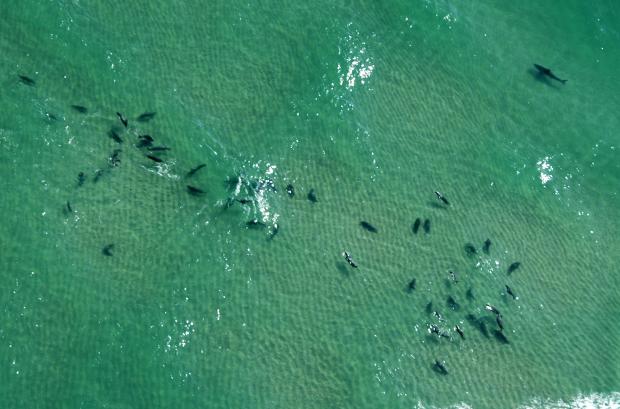Overview
Sharks travel to state waters each spring, summer, and fall in search of food and mating opportunities. At least a dozen shark species visit our coastline from May to November, migrating from overwintering areas off the southeastern U.S., the Gulf of Mexico, and the mid-Atlantic. They arrive to feed in Massachusetts' nutrient-rich waters and for some species, to take advantage of potential mating opportunities.
Sharks, in general, are highly migratory fishes, but can differ dramatically in shape, size, and natural history. Oceanic sharks, like the blue and mako, largely remain miles offshore, while coastal sharks, like the sand tiger and smooth dogfish, swim close to shore and even enter bays and estuaries. Some species, like the basking shark, can be found both inshore and offshore. Regardless, all are seasonal visitors, except for the porbeagle, which resides in New England waters year-round. Our most well-known visitor is the white shark!
About the program
This program studies many aspects of the biology of sharks in Massachusetts and adjacent waters including:
- Ecology
- Distribution and movements
- Relative abundance
- Essential habitat
- Natural history
- Physiology
Our researchers conduct directed field research, sample recreational and commercial catches, and collaborate with other scientists to study these animals. By dissecting specimens, we investigate the age, feeding ecology, and reproductive status of sharks. Tagging live sharks with sophisticated technology allows us to study the shark's distribution and movements.
This research helps the program achieve its goals to:
- Foster cooperative research
- Participate in state, regional, and federal management processes
- Provide public education on these shark species
White sharks population research
Since 2009, DMF scientists have been studying many aspects of the white shark, which has become more abundant in MA state waters since the restoration of seal populations. This work has centered on movement ecology and natural history. To date, over 120 individuals white sharks have been tagged with a variety of tag technologies.
In 2014, the program initiated an intensive 5-year study with the UMASS School for Marine Science and Technology to quantify the regional population size and relative abundance of white sharks in Massachusetts waters. The Atlantic White Shark Conservancy has assisted with this study by contributing funds and providing logistical support. To date, more than 300 individual white sharks have been cataloged during the study.
